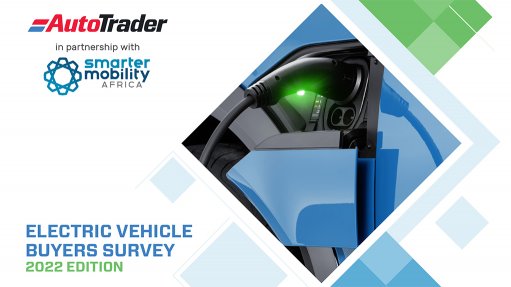
Digital automotive marketplace AutoTrader and Smarter Mobility Africa have produced their third study that focuses on South African consumers’ perceptions of electric vehicles (EVs), as well as their preferences in considering EVs as a mode of transport.
Unpacking the 2022 AutoTrader Electric Vehicle Buyers Survey reveals that the initial cost of purchase remains one of the vehicle type’s biggest drawbacks.
“EVs in South Africa have the added disadvantage of incurring substantial taxes,” notes AutoTrader CEO George Mienie.
“Internal combustion engine (ICE) imports incur an 18% duty, versus 25% on EV imports, which pushes the cost of an EV to twice that of the average price of a new ICE vehicle (of a similar make/model),” he explains.
“It is interesting in the survey to note that the initial cost of purchase has become an even bigger disadvantage to consumers,” says Mienie.
The survey also highlights that the early adoption of EVs is decreasing in South Africa as consumers are becoming more educated about what the future holds for EVs as a mode of transport.
As battery technology continues to develop, it will not only reduce the initial cost of EVs, but also increase the range of these vehicles.
“The data shows that consumers are pushing out their purchase intent and almost taking a wait-and-see approach,” says Mienie.
According to the report, the number of people willing to pay more for an EV upfront, even given its lower running costs, fell from 68.2% in 2021, to 64.6% in 2022.
The report states that an EV costs about 75% less to ‘refuel’, on average, compared with an ICE car.
Battery efficiency, safety and price have emerged as the most important considerations when purchasing an EV.
Reduced carbon emissions and air pollution, followed by cheaper running costs, were cited as big advantages of owning an EV.
EVs are still out of reach for more than two-thirds of consumers in South Africa, notes the report.
However, 64% of respondents indicate a willingness to spend up to R500 000 on an EV.
Range Anxiety
Vehicle manufacturers are currently producing EVs that travel further than 700 km on a single charge. In South Africa, EVs like the Jaguar I-Pace can travel up to 470 km on a single charge.
Range anxiety declined in 2022, according to the AutoTrader survey, and respondents appear to be more realistic about range (300 km to 500 km) than they have been in the past.
Still, insofar as purchasing intent is concerned, range expectations remain higher, with the majority of respondents (37%) stating they would consider buying an EV if it had a range of between 500 km and 700 km.
On a more positive note, charging infrastructure worries, cited as the main disadvantage in the previous AutoTrader report, have declined.
The number of people who have driven an EV locally has also increased, up from 12% in 2021, to 15% in 2022.
Disadvantages
Given South Africans’ love of driving, self-driving technology came in as the least influential factor in the purchase of an EV, states the AutoTrader report.
Charging time emerged as the second most noted disadvantage, increasing from 58% in 2021 to 59%.
However, 81% of respondents stated that they would consider purchasing an EV if it could be fully charged in under an hour at a fast charging station, while more than 70% of respondents with a higher disposable income want home charging of four hours or less.
Respondents cited the three most trusted EV brands as BMW, Tesla and Toyota. (Tesla does not have a presence or offering in South Africa.)
Supply & Demand
EV searches continue to surge, says the AutoTrader report.
In the first half of 2022, EV searches on AutoTrader using the fuel-type filter increased by 99.95% year-on-year, while hybrid searches soared by 129%.
EV views rose by 133%, with the Audi RS e-tron, Audi e-tron and Porsche Taycan the three most viewed EVs.
Views for hybrids, with their combination of combustion engine and electric motor, increased by 61.28%, with the BMW i8, locally built Toyota Corolla Cross, and Ferrari SF90 emerging as the most viewed models.
One of the earlier EV entrants to the local market, the BMW i3 is the most listed EV, with 2019 models priced at around R666 000, while the second-most listed EV, the Porsche Taycan, costs an average of R3.1-million.
In the hybrid sphere, the BMW i8 is the most listed vehicle.
”Despite all the new car EV entrants to the local market, used EVs and hybrids have reduced in supply, suggesting increased appetite for EVs, and that current owners are perhaps hanging on to their vehicles,” notes Mienie.
“Those that do come onto the used market are quickly snapped up at good prices.”
Just under 80% of respondents in the AutoTrader survey say they will consider a used EV with under 60 000 km on the odometer.